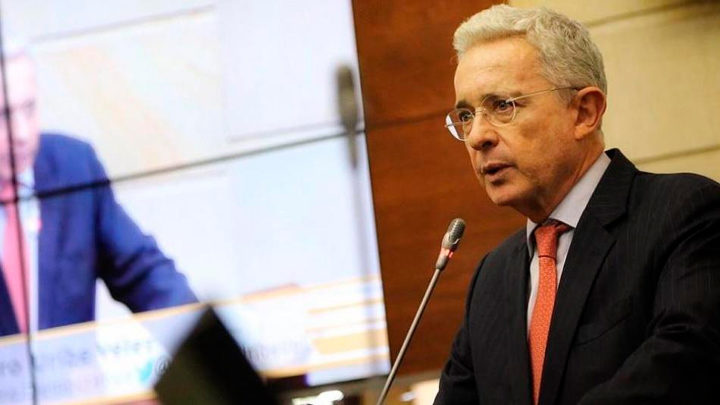While the former president and senator for the Democratic Centre Party (Centro Democratico in Spanish) is being investigated for alleged procedural fraud and bribery, his files in various judicial offices are still full of not yet resolved facts related to murders, massacres, displacements and alleged links with paramilitary groups.
Today, the most representative leader of the governing party, even above the President of the Republic himself, is experiencing the paradoxes of political life: from plaintiff, to subject of an investigation, and, now, facing preventive house arrest as he awaits trial.
It all began in February 2012 as a lawsuit against Senator Iván Cepeda of the Democratic Pole Party (Polo Democrático in Spanish) on the grounds of abuse of public office and procedural fraud. Cepeda allegedly took advantage of his parliamentary functions in order to enter several of the country’s prisons and interview ex-paramilitaries, who assured that former President Uribe had created the Accu Metro Block (A paramilitary brigade), along with his brother Santiago, and several other businessmen from the Northeast region of Antioquia. Four years later, the suit became a trial against Uribe himself, as now it is presumed that he tried to manipulate those same witnesses to not testify against him.
In the midst of that process, Cepeda had called for a debate in the Senate on the political control over paramilitaries in Antioquia, scheduled for September 17, 2014. As emotions grew high, Uribe burst out of the premises and went to the Supreme Court of Justice to present evidence that said this debate had the “support of terrorists”, and presented documents gathering the testimonies of several ex-paramilitaries, who accused the Democratic Pole senator of being guilty of witness tampering.
Four years later, the opposite came to light: it was Uribe who would end up as a suspect of bribery, through several of his lawyers, to a group of witnesses to retract the accusations against him. This was recorded in a February 16, 2018 ruling, by which the Supreme Court of Justice acquitted Cepeda and issued information to investigate the Democratic Center leader for witness tampering.
While Uribe’s complaint against Cepeda was under investigation, calls between the former president, his lawyers and friends were intercepted. According to the investigators, it’s possible they had made “arrangements” to change the witnesses’ statements.
Based on these findings, the Court’s Investigation Chamber took a surprising step: it issued a security measure and ordered Senator Uribe’s arrest.
This decision stirred up the nerves of the political leader’s allies, who issued widespread criticisms against the Court for taking excessive measures, and called on their social base to demonstrate on the streets, even as mobility restrictions were imposed to contain the spread of the COVID-19 virus.
However, the charge for which Senator Uribe is under house arrest is one of the least serious against him. For several years now, dozens of files containing the testimonies of former paramilitaries who had benefited from the Justice and Peace Law (a transitional mechanism approved by his government) as well as other witnesses who appeared before the so-called ordinary courts have been lying on the shelves of various judicial offices with no apparent progress.
In these testimonies, the former president is repeatedly named and associated with various events related to the armed conflict, which is why magistrates of various courts have issued information so that the senator can be investigated for these criminal acts.
These crimes include massacres perpetrated in the townships of El Aro and La Granja in Ituango, Antioquia; the murder of human rights activist Jesús María Valle, a native of that municipality; paramilitary actions in the south-west and north-east regions of Antioquia, among others. These and other events occurred when Senator Uribe was Governor of Antioquia (1995-1997).
There are also facts around Uribe about which there is not enough clarity or conclusive judicial investigations, such as the illegal interceptions carried out during his first presidential term (2002-2006) by the Administrative Department of Security on human rights activists, journalists and, most seriously, the Supreme Court of Justice while it prosecuted dozens of congressmen for their alliances with the United Self-Defense Forces of Colombia, including his cousin and political mentor, Mario Uribe Escobar.
There were also scandals during his second presidential term (2006-2010), including famous visits to the Casa de Nariño (the presidential palace) in April 2008 by emissaries of the powerful paramilitary chief and drug trafficker Diego Fernando Murillo Bejarano, alias ‘Don Berna’, to discuss a plot by the Supreme Court of Justice and, Assistant Justice Iván Velásquez, in particular, who was responsible for the so-called ‘parapolitics’ process.
The review of several files also reveals the murder of witnesses who have linked Senator Uribe to acts of violence, like Francisco Villalba, shot in April 2009 in the municipality of La Estrella, south of the metropolitan area. This ex-paramilitary linked the political leader to the El Aro massacre in Ituango, Antioquia, in October 1997, two months before his term as governor ended.
The Instruction Chamber of the Supreme Court of Justice’s decision is important because it advances the investigation, which will have to take several more steps in order to reach the trial stage. Nevertheless, it is necessary to emphasize that much more work is needed to clear up the question of impunity that surrounds the processes against the leader of the Democratic Center.
In order to have a better context, this website presents a great part of the dossier built over the years, where former president and senator Álvaro Uribe may be implicated in facts related to Colombia’s armed conflict. While Uribe is now held to answer for minor crimes, others yet unresolved lie beyond.
See the complete dossier here: The shadows that surround the former president
Translated by Octavio García Soto






